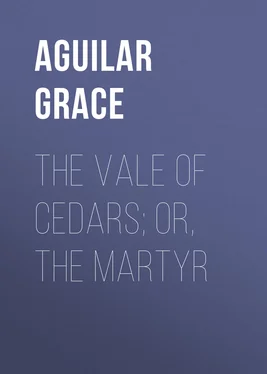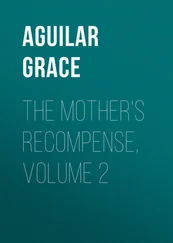Grace Aguilar - The Vale of Cedars; Or, The Martyr
Здесь есть возможность читать онлайн «Grace Aguilar - The Vale of Cedars; Or, The Martyr» — ознакомительный отрывок электронной книги совершенно бесплатно, а после прочтения отрывка купить полную версию. В некоторых случаях можно слушать аудио, скачать через торрент в формате fb2 и присутствует краткое содержание. Жанр: Альтернативная история, foreign_antique, foreign_prose, Исторические приключения, на английском языке. Описание произведения, (предисловие) а так же отзывы посетителей доступны на портале библиотеки ЛибКат.
- Название:The Vale of Cedars; Or, The Martyr
- Автор:
- Жанр:
- Год:неизвестен
- ISBN:нет данных
- Рейтинг книги:3 / 5. Голосов: 1
-
Избранное:Добавить в избранное
- Отзывы:
-
Ваша оценка:
- 60
- 1
- 2
- 3
- 4
- 5
The Vale of Cedars; Or, The Martyr: краткое содержание, описание и аннотация
Предлагаем к чтению аннотацию, описание, краткое содержание или предисловие (зависит от того, что написал сам автор книги «The Vale of Cedars; Or, The Martyr»). Если вы не нашли необходимую информацию о книге — напишите в комментариях, мы постараемся отыскать её.
The Vale of Cedars; Or, The Martyr — читать онлайн ознакомительный отрывок
Ниже представлен текст книги, разбитый по страницам. Система сохранения места последней прочитанной страницы, позволяет с удобством читать онлайн бесплатно книгу «The Vale of Cedars; Or, The Martyr», без необходимости каждый раз заново искать на чём Вы остановились. Поставьте закладку, и сможете в любой момент перейти на страницу, на которой закончили чтение.
Интервал:
Закладка:
The petty Sovereignties of the Peninsular, with the sole exception of the mountainous district of Navarre, and the Moorish territories in the south, were now all united; and it was the sagacious ambition of Ferdinand and Isabella to render Spain as important in the scale of kingdoms as any other European territory; and to do this, they knew, demanded as firm a control over their own subjects, as the subjection of still harassing foes.
Above a century had elapsed since Spain had been exposed to the sway of weak or evil kings, and all the consequent miseries of misrule and war. Rapine, outrage, and murder had become so frequent and unchecked, as frequently to interrupt commerce, by preventing all communication between one place and another. The people acknowledged no law but their own passions. The nobles were so engrossed with hatred of each other, and universal contempt of their late sovereign, with personal ambition and general discontent, that they had little time or leisure to attend to any but their own interest. But a very brief interval convinced both nobles and people that a new era was dawning for them. In the short period of eighteen months, the wise administration of Isabella and Ferdinand, had effected a sufficient change to startle all ranks into the conviction that their best interests lay in prompt obedience, and in exerting themselves in their several spheres, to second the sovereign's will. The chivalric qualities of Ferdinand, his undoubted wisdom and unwavering firmness, excited both love and fear; while devotion itself is not too strong a term to express the national feeling entertained toward Isabella. Her sweet, womanly gentleness, blended as it was with the dignity of the sovereign; her ready sympathy in all that concerned her people—for the lowest of her subjects; doing justice, even if it were the proud noble who injured, and the serf that suffered—all was so strange, yet fraught with such national repose, that her influence every year increased; while every emotion of chivalry found exercise, and yet rest in the heart of the aristocracy for their Queen; her simple word would be obeyed, on the instant, by men who would have paused, and weighed, and reasoned, if any other—even Ferdinand himself—had spoken. Isabella knew her power; and if ever sovereign used it for the good, the happiness of her people, that proud glory was her own.
In spite of the miserable condition of the people during the civil struggles, the wealth of Spain had not decreased. It was protected and increased by a class of people whose low and despised estate was, probably, their safeguard—these were the Jews, who for many centuries had, both publicly and secretly, resided in Spain. There were many classes of this people in the land, scattered alike over Castile, Leon, Arragon, Navarre, and also in the Moorish territories; some there were confined to the mystic learning and profound studies of the schools, whence they sent many deeply learned men to other countries, where their worth and wisdom gained them yet greater regard than they received in Spain: others were low and degraded in outward seeming, yet literally holding and guiding the financial and commercial interests of the kingdom;—whose position was of the lowest—scorned and hated by the very people who yet employed them, and exposed to insult from every class; the third, and by far the largest body of Spanish Jews, were those who, Israelites in secret, were so completely Catholic in seeming, that the court, the camp, the council, even the monasteries themselves, counted them amongst them. And this had been the case for years—we should say for centuries—and yet so inviolable was the faith pledged to each other, so awful the dangers around them, were even suspicion excited, that the fatal secret never transpired; offices of state, as well as distinctions of honor, were frequently conferred on men who, had their faith or race been suspected, would have been regarded as the scum of the earth, and sentenced to torture and death, for daring to pass for what they were not. At the period of which we write, the fatal enemy to the secret Jews of more modern times, known as the Holy Office, did not exist; but a secret and terrible tribunal there was, whose power and extent were unknown to the Sovereigns of the land.
The Inquisition is generally supposed to have been founded by Ferdinand and Isabella, about the year 1480 or '82; but a deeper research informs us that it had been introduced into Spain several centuries earlier, and obtained great influence in Arragon. Confiding in the protection of the papal see, the Inquisitors set no bounds to their ferocity: secret informations, imprisonments, tortures, midnight assassinations, marked their proceedings; but they overreached themselves. All Spain, setting aside petty rivalships, rose up against them. All who should give them encouragement or assistance were declared traitors to their country; the very lives of the Inquisitors and their families were, in the first burst of fury, endangered; but after a time, imagining they had sunk into harmless insignificance, their oppressors desisted in their efforts against them, and were guilty of the unpardonable error of not exterminating them entirely. 1 1 Stockdale's History of the Inquisition.
According to the popular belief, the dreaded tribunal slept, and so soundly, they feared not, imagined not its awakening. They little knew that its subterranean halls were established near almost all the principal cities, and that its engines were often at work, even in the palaces of kings. Many a family wept the loss of a beloved member, they knew not, guessed not how—for those who once entered those fatal walls were never permitted to depart; so secret were their measures, that even the existence of this fearful mockery of justice and Religion was not known, or at that time it would have been wholly eradicated. Superstition had not then gained the ascendency which in after years so tarnished the glory of Spain, and opened the wide gates to the ruin and debasement under which she labors now. The fierce wars and revolutions ravaging the land had given too many, and too favorable opportunities for the exercise of this secret power; but still, regard for their own safety prevented the more public display of their office, as ambition prompted. The vigorous proceedings of Ferdinand and Isabella rendered them yet more wary; and little did the Sovereigns suspect that in their very courts this fatal power held sway. The existence of this tribunal naturally increased the dangers environing the Israelites who were daring enough to live amongst the Catholics as one of them; but of this particular danger they themselves were not generally aware, and their extraordinary skill in the concealment of their faith (to every item of which they yet adhered) baffled, except in a very few instances, even these ministers of darkness.
CHAPTER IV
"In war did never lion rage more fierce—
In peace was never gentle lamb more mild,
Than was that young and princely gentleman."
The wars ravaging Spain had nursed many a gallant warrior, and given ample opportunities for the possession and display of those chivalric qualities without which, in that age, no manly character was considered perfect. The armies of Ferdinand and Isabella counted some of the noblest names and most valiant knights of Christendom. The Spanish chivalry had always been famous, and when once organized under a leader of such capacity and firmness as Ferdinand; when the notice and regard of the Queen they idolized could only be obtained by manly virtue as well as the warrior's ardor, a new spirit seemed to wake within them; petty rivalships and jealousies were laid aside, all they sought was to become distinguished; and never had chivalry shone with so pure and glorious a lustre in the court of Spain as then, when, invisibly and unconsciously, it verged on its decline.
Читать дальшеИнтервал:
Закладка:
Похожие книги на «The Vale of Cedars; Or, The Martyr»
Представляем Вашему вниманию похожие книги на «The Vale of Cedars; Or, The Martyr» списком для выбора. Мы отобрали схожую по названию и смыслу литературу в надежде предоставить читателям больше вариантов отыскать новые, интересные, ещё непрочитанные произведения.
Обсуждение, отзывы о книге «The Vale of Cedars; Or, The Martyr» и просто собственные мнения читателей. Оставьте ваши комментарии, напишите, что Вы думаете о произведении, его смысле или главных героях. Укажите что конкретно понравилось, а что нет, и почему Вы так считаете.












